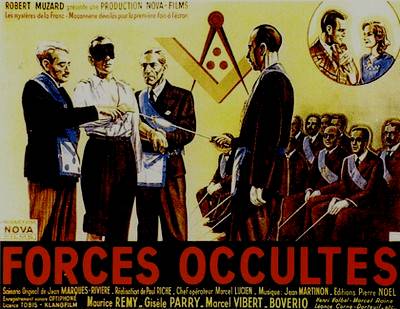
"The only difference
between a caprice and a life-long passion
is that the caprice lasts a little longer."
Oscar Wilde (1854-1900), Anglo-Irish playright,
author.
In the mid-1930s, Bernard Fay authored books with titles such as "Revolution and Freemasonry" and "Franklin" (about Benjamin Franklin). Reading them now and looking on the life of Fay in hindsight, it is easy to see a progression from Masonic critic to anti-Masonic activist. His "Revolution" book, for example, talks of the entanglements between the United States and France during and after the American Revolution. Although painting them in an unflattering light, his writings seemed to be dismissed as those of a hyper-critical author. His later life, though, showed them as the ferment of vicious activity.

Credited with the death and suffering of many Freemasons during World War II, Professor Bernard Fay, of the College de France and director of the National Library, was a very active "collaborator". He was tried and convicted by a court of justice in Paris. Despite a plea from the prosecution that he receive the death penalty, the court was lenient and sentenced him to imprisonment at hard labor for life, the confiscation of all his property, and "national degradation".
When he was interrogated by the court, he told them "I was glad to have in my hands the instrument capable of renovating the country. My mission was to organize a service for the detection of the Freemasons and masonic archives. To be successful in that work, I was obligated to have relations with the Germans, especially as they had an organization parallel with ours." Fay claimed that he was "...a historian who was doing this for intellectual reasons."
In May, 1947, the Philalethes Magazine reported that "The bureau of which Fay was the head prepared a card index containing 60,000 names. Lists of names of Masons were released to the official gazette of the Vichy government for publication, and many catholic papers copied these lists in order to boycott and publicly shame the Brethren so listed. Hunted down and persecuted for the sole reason that they belonged to the Masonic Fraternity, 989 Masons were sent to Germany and 549 were executed by firing squads or perished in concentration camps."
Fay's book, "Revolution and Freemasonry", is often cited by anti-Masons as 'proving' that Masons were directly involved in the French Revolution - although as it can be seen from the above, Fay was hardly objective in his work.
![]()
For more information...
In September, 2011 a book documenting the relationship between Bernard Fay and author Gertrude Stein was published titled "Unlikely Collaboration".
Wikipedia noted about Stein: "Prior to World War II she made public her opinion that Adolf Hitler should be awarded the Nobel Peace Prize. "I say that Hitler ought to have the peace prize, because he is removing all the elements of contest and of struggle from Germany. By driving out the Jews and the democratic and Left element, he is driving out everything that conduces to activity. That means peace.... By suppressing Jews... he was ending struggle in Germany," (New York Times Magazine, May 6, 1934) and thus would be most receptive to the ideas of Fay who, it seems, became a close confident during the period between the two World Wars.
This is a very interesting book and provides much information relating to both anti-Semitism and anti-Masonry. We'd encourage you to pick up a copy. A link to Amazon is on the right.
![]()
We acknowledge with gratitude permission from the Philalethes Society permission to quote from their magazine. For more information about the Philalethes Society, you may visit their website here.
![]()
|
Related Topics: |
|
In addition, |